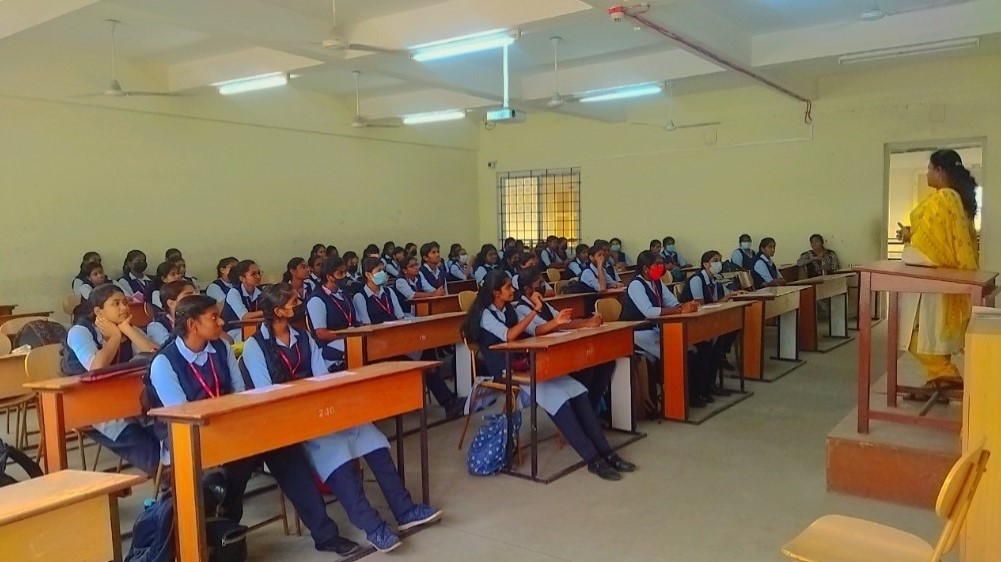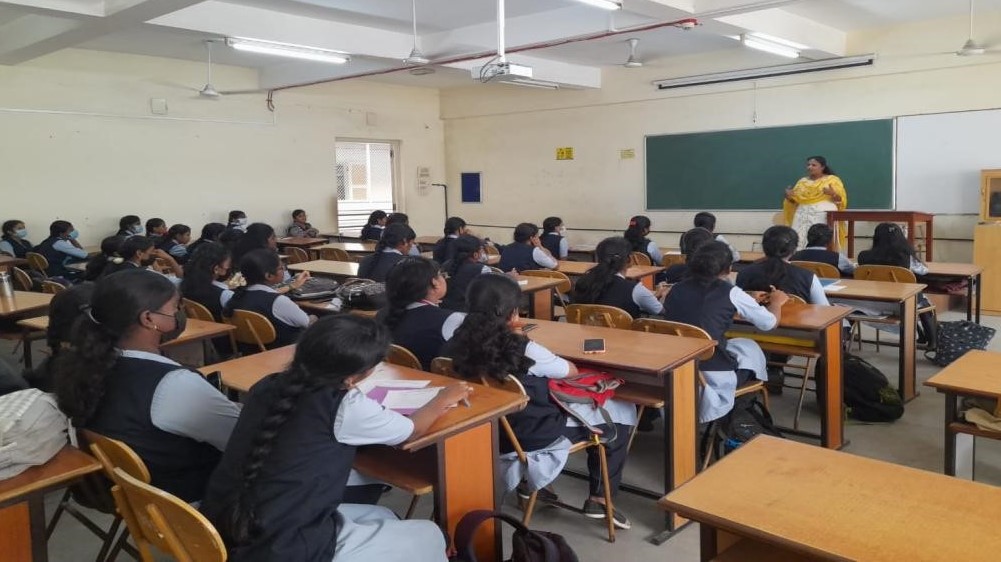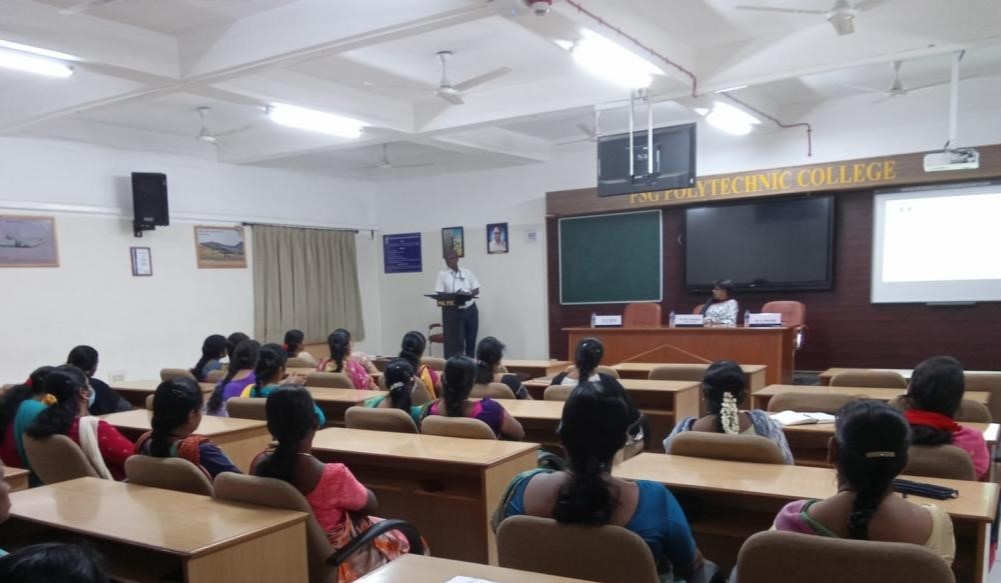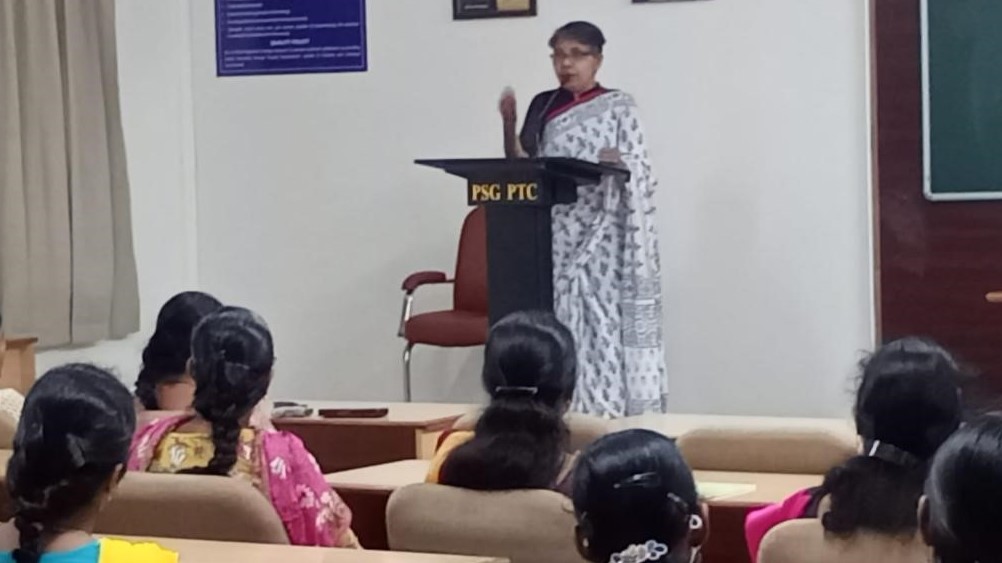Ms S Sasikala,
Head of the Department
Presiding Officer
Department of Electrical and Electronics Engineering
PSG Polytechnic College, Peelamedu,
Coimbatore - 641004, Tamil Nadu, India
[email protected]
Phone: 9944933172
Whom To Contact
Ms S Sasikala
Presiding Officer (Faculty)
HoD, DEEE
[email protected]
9944933172
Dr S Sharmila
Member (Faculty)
HoD, DECE
[email protected]
8838463369
Ms B Arthy
Member (Faculty)
Lecturer, DME
[email protected]
9894722804
Ms M Shanthi
Member (Supporting Staff)
Junior Assistant, Principal Office
[email protected]
7448463614
Mr.D.Ramesh
Member (Supporting Staff)
Instructor,DAE
Ms.N.Preethi (22DH04)
Member (Student)
DDD
Mr.S.Karthik (22DX10)
Member (Student)
DCE
Ms.F.Bernice Renita (22DC06)
Member (Student)
DCN
Dr.Meerakrishnan
Member (External – NGO)
Project Director, Chinmaya Organisation & Rural Development
Ms.S.Vimala
Member (External – NGO)
Wellness Center, PSGIMS & R
Ms.Jenisha
Member (External – NGO)
Nithya Gurukula, Coimbatore
As per the guidelines of UGC and the Supreme Court an Anti-Sexual Harassment Committee has been established by the college to provide a healthy atmosphere to the students of the college. Anti Sexual Harassment Committee deals with issues relating to sexual harassment. The committee is formed to prevent sexual assault, rape and other related crimes on girl students. Goal : Prevention of sexual harassment to ensure safe environment for girl students for the studies.
For this purpose, sexual harassment includes unwelcome sexually determined behavior (whether
directly or by implication) such as:
Anti Sexual Harassment Cell assures all the complaints of the students, teaching and non-teaching staffs are
treated with dignity and respect and the complaints should be maintained confidential.
False Reporting: Intentionally making a false report or providing false information is grounds for indiscipline.
Every woman in our country has their rights to live and educate themselves, and they must be well protected for the
development of the nation. According to the UN, “gender equality and the empowerment of women and girls is not just a goal
in itself, but a key to sustainable development, economic growth, and peace and security”. Both central and state government
insisting all educational institutions to frame a committee to monitor and complaint if such harassment happens. Rather educational
institutions, in all workplace women and girls have to be protected. In this regard ‘Sexual Harassment of Women at Workplace Act was implemented since 2013.
The sexual harassment results in violation of the basic fundamental rights of women especially right to equality under article 14 & 15 of
the Indian constitution and her right to life and to live with dignity under article 21 of the constitution. An Act to provide protection against
sexual harassment of women at workplace and for the prevention and redressal of complaints of sexual harassment and for matters connected therewith. As per
instruction from AICTE, all approved institutions have to conduct awareness program on the Act, formation and conduct of meeting with ICC members.
In this regard, PSG Polytechnic College conducted
As a brief note, an Awareness program on “Sexual Harassment Act” conducted on 14.11.2022 for girl students in our polytechnic college at I 613 between 4 and 4.30 pm continued by the “Elimination of Violence against
Women” between 4.30 to 5 pm. Dr. S. Sharmila, Faculty Advisor/WID welcomed the chief guest and the students. Ms. D. Kavitha B.A., B.L., Advocate, Coimbatore addressed the gathering.
Ms. D. Kavitha briefed the kind of harassment takes place, ways to prevent them, person to complaint and take action of the complaint, and ICC Committee in the college. She also insisted students to be
aware of the harassment inside and outside the premises, at home, during travelling etc., Girl students interacted with the resource person and benefited with this program. Violence against women should be totally eliminated inside
the premises. Chief guest guided the students about the violent activities to be happened and that should be stopped and complained to the respective authorities. 54 students attended both programs, and feedback was collected at the end of the
two sessions. Few points about the feedback of the program.


PSG Polytechnic College, CIICP/Women in Development Cell conducted “Sexual Harassment Act and Legal Security for Women” program on 19.11.2022 at 10am in I305
for faculty and staff members. Ms. N.V.Sreejaya, leading lawyer in Coimbatore, India and Solicitor in England and Wales, UK was the resource person.
Dr. S. Sharmila, Thrust Area Manager, WID welcomed the gathering. Dr. B. Giriraj, Principal, PSG Polytechnic college presided the function.

Ms. Sreejaya’s explanation about the types of harassment at the workplace, at home, at travel and at public places was an eye opener. She illustrated with many case studies for understanding
and asked all faculty staff members to educate girl students and their own boy and
girl children’s about these happenings. She discussed about the legal approach and punishments of the violence. 37 faculty and staff members participated and interacted with the guest and got clarified their doubts.

Policy on Sexual Harassment
Preamble:
The PSG Polytechnic College has been established has committed itself to provide a congenial and conducive atmosphere in which students, teachers and non-teaching staff can work together in an environment free of violence, harassment, exploitation, and intimidation. This includes all forms of gender violence, sexual harassment, and discrimination on the basis of gender. Every member is expected to be aware of the commitment to the right to freedom of expression and association, it strongly supports gender equality and opposes any form of gender discrimination and violence.
The Supreme Court of India, in a landmark judgment in August 1997 (Vishaka & others vs. the State of Tamil Nadu & others) stated that every instance of sexual harassment is a violation of “Fundamental Rights” under Articles 14, 15, and 21 of the Constitution of India, and amounts to a violation of the “Right to Freedom” under Article 19 (1)(g). Another Supreme Court Judgment in January 1999 (Apparel Export Promotion Council vs. Chopra) has stated that sexually harassing behaviour “needs to be eliminated as there is no compromise on such violations”. The Supreme Court further reiterated that sexual harassment “is a violation of the fundamental right to gender equality and the right to life and liberty”.
Based on these, the University, to which the college is affiliated, made it mandatory for the affiliated and constituent colleges to adhere to the following from the year 2002:
Declaration of Policy
PSG Polytechnic College,shall value the dignity of every individual, enhance the development of its human resources, guarantee full respect for human rights, ensures the full enforcement of “Fundamental Rights” under articles 14, 15, 19(1) (g) and 21 of the Constitution of India , and uphold the dignity of workers, employees, applicants for employment, students or those undergoing training, instruction or education. Towards this end, all forms of sexual harassment in the employment, education or training environment are hereby declared unlawful. The Sexual Harassment of Women at Workplace (Prevention, Prohibition, and Redressal) Act 2013 is implemented in its entirety.
FUNCTIONS OF THE COMMITTEE
1. PREVENTIVE STEPS
It will be the endeavour of the committee :
2. REMEDIAL STEPS
PROCEDURE TO BE FOLLOWED BY THE COMMITTEE
1.Warning
2.Written apology
3.Bond of good behaviour
4.Adverse remarks in the confidential report
5.Debarring from supervisory duties
6.Denial of membership of statutory bodies
7.Denial of re-employment/re - admission
8.Stopping of increments / promotion/denying admission ticket
9.Reverting, demotion
10.Suspension
11.Dismissal
12.Any other relevant mechanism